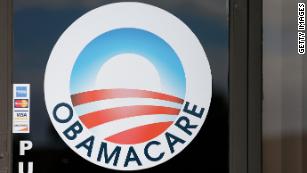I'm a Brit and America, your health care system is torturing me
By Rob Crilly
Updated 7:53 AM ET, Fri January 4, 2019

The history of Obamacare 02:09
Rob Crilly is a British journalist living in New York. He was The Telegraph's Afghanistan and Pakistan correspondent and was the East Africa correspondent for The Times of London. The opinions in this article are those of the author. View more opinion articles on CNN.
(CNN)I am a Brit who lives in the United States. I signed up for medical insurance via the Obamacare marketplace in 2015, and I don't know how you Americans navigate the health care system on a day-to-day basis. To me, the hoops you have to jump through are costly -- and often illogical. And, more importantly, they are in desperate need of a fix.
It's taken me four years, but I am only now coming to grips with my health insurance policy. It is a health maintenance organization, which means that I have to see my primary care physician for a referral for most specialist services.
I know all this because it was explained to me by an exasperated office manager who put on the sort of voice usually reserved for addressing truculent 5-year-olds. She telephoned two weeks ago to upbraid me for getting the wrong type of referral for an appointment. I hadn't known there was a wrong type.

Rob Crilly
Apparently, my referral needed to make reference to the fact that it was a HIP plan (the Health Insurance Plan of Greater New York is one of the two companies that merged to form EmblemHealth, my current insurer) in order to proceed. I hadn't pointed this out when I supplied my policy number, and somewhere down the line my referral had run into the buffers.
That awkward exchange was followed rapidly by a second call from a different office manager (at a second doctor's office) telephoning me to explain that although I had seen the right doctor last month for my knee, it turned out that I had been at entirely the wrong location.
I hadn't known there could be a wrong location. But it turned out the Brooklyn office situated conveniently near my home was not the right one; the midtown office, a 35-minute subway ride away, was the one covered by my insurance.
When I reached out to EmblemHealth to explain the location discrepancy, a representative emailed me, "Providers, including physician and other practitioners, have the choice about whether they participate with us at some of their locations, or at all of their locations."
The sheer, bewildering complexity of it all
Before arriving in the United States, I was well aware of the inequities of the American health care "system" -- the millions uninsured, the waste of money spent on unnecessary tests or treatments and the people financially ruined after having the misfortune to fall ill. What no one had briefed me on was the sheer bewildering complexity of it all -- particularly Obamacare, which I regularly struggle to navigate. It is only since living here, for example, that I have come to realize that the important thing is not just that Britain's National Health Service is funded by the taxpayer, but that it is "free at the point of delivery" -- without the sort of forms, claims or acronyms that make medical billing an actual degree course.
But I welcomed the office managers' phone explanations. During my career as a foreign correspondent, I have generally found it prudent to listen to locals bearing advice and acronyms -- particularly when it comes to navigating issues of Byzantine complexity, such as the tribal structure of North Darfur's nomadic herders or the blood vendettas of MS-13 gangs in San Pedro Sula, Honduras, or even finding my way around the AirTrain at New York's John F. Kennedy Airport.
The only problem was that on this occasion the gist-giving was somewhat redundant, following, as it did, an email a month earlier from my insurance company informing me that it was discontinuing my policy at the end of the year.
A company spokeswoman was very apologetic when I emailed to ask whether this was simply being done to further confuse foreigners. Ongoing legal action by another insurer against New York state and its formulas for calculating rates, she said, was to blame for casting uncertainty on EmblemHealth's offerings. "With the program currently on hold for 2019, it impacted our ability to continue the plan," she wrote.
There is much, much more I still do not know
I spent the end of December struggling to grasp as much as possible about New York's health insurance marketplace -- and I learned there is much, much more I still do not know about US health care policy. Trawling through the different companies' offerings, weighing deductibles versus out-of-pocket maximums, distinguishing between HMOs and EPOs (exclusive provider organizations) is meaningless when you haven't already spent a lifetime in the system.
I shudder to think what it was like before Obamacare, when you couldn't even be sure that the basics were covered without an M.D. after your name, a magnifying glass for the small print and a couple of weeks with nothing much in the diary.
Even so, since I've become a freelancer in the United States, I've been jerked around by the New York State of Health marketplace, set up under Obamacare, and its spiraling prices.
The email at the end of that first year came as a rude shock. My insurer told me my premium was going up by 20%. The problem was the Affordable Care Act, according to my then-insurer, and an unforeseen number of people with pre-existing conditions signing up.
Two years later, it was the same thing but different. With Donald Trump ending the "individual mandate," too few healthy people were signing up. "When only sicker people buy health coverage," ran another of the patronizing explanations that I seem to attract, "it costs more." About 30% more in the case of the EmblemHealth HIP plans, according to an email sent to customers during the summer. Or it would have been if New York state hadn't told the company to give consumers a break, limiting increases to single digits, and if my policy wasn't being discontinued anyway, per the email I received in the fall.
Rather like when the British rail system ground to a halt because of the wrong type of snow, the American health care system apparently is beset by the wrong type of patients: ill ones.
Medicare for all sounds like a possibility
So, what is the solution? Medicare for all, which progressives are pushing, sounds like a possibility. Maybe it could work, like it does in Britain. Sure, there's a trade-off in terms of choice, speed and availability of the most expensive drugs, but the upside is a universal system where everyone is treated the same when they turn up at their doctor's office. There's no chance your doctor is "out of network."
This bewildered patient is at least grateful that one part of Obamacare remains intact -- the metal ratings that lets one compare easily between gold, silver or bronze policies (but which also reinforce the sure feeling that I am a loser in life as I plunge straight into the cheapest category).
This was perhaps Obama's greatest masterstroke. Could he actually have known his successor would be a precious metal enthusiast, keen to see them on everything from elevator doors to health insurance?
Stay up to date...
I am, of course, not the first to complain about the system's complexity. And EmblemHealth says it is constantly working to demystify the system. "We want members to be informed about the costs associated with their care, so early next year, we will be introducing a simple, clear and straightforward explanation of what was charged by the clinician, what the plan paid and the costs for which the individual is responsible," the spokeswoman told me.
Anyway, with the clock ticking down to the recent enrollment deadline, I did what I always do when baffled by the wide choice on offer. I went for the easy bronze and picked the second cheapest option.
Then, and only then, did I stop to wonder whether my current doctor was covered.














No comments:
Post a Comment